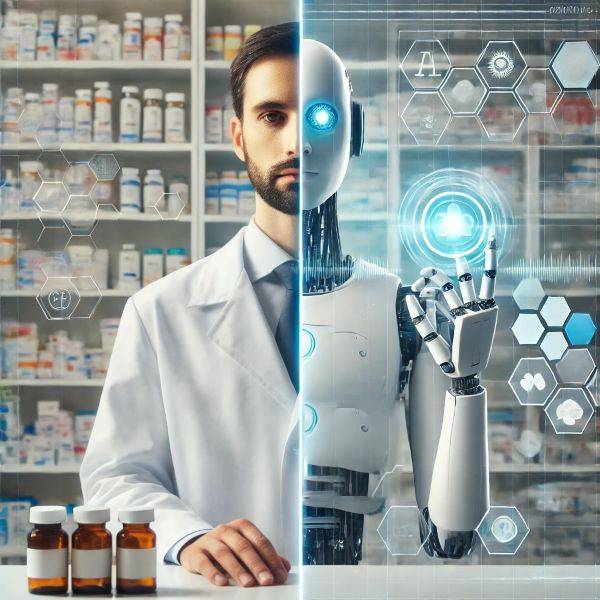The Rise of AI in Pharmacy: A Blessing or a Threat?
Imagine walking into a pharmacy and being greeted by a robotic pharmacist, no human in sight. Instead of a friendly conversation, you scan your prescription, an AI system verifies it, and a robotic arm retrieves your medication. No delays, no human errors, just pure efficiency.
Sounds futuristic? Maybe. Sounds inevitable? That’s up for debate.
Artificial intelligence (AI) is rapidly transforming healthcare, and pharmacy is no exception. From automated prescription verification to AI-driven drug interaction analysis, technology is stepping up. But the big question remains: Will AI ever replace human pharmacists? Or is this just another tool to help them do their job better?
The Role of AI in Modern Pharmacy: What Can It Do?
AI is already playing a major role in pharmacy, but it’s not taking over just yet. Here are some key areas where AI is currently being used:
First, prescription processing and error reduction. AI-powered systems like MedAware and IBM Watson Health help detect prescription errors, drug interactions, and fraudulent prescriptions before they reach the patient. Major pharmacy chains like CVS and Walgreens use automated verification tools to flag potential issues, but human pharmacists still make the final call.
Second, medication adherence and patient engagement. AI chatbots like Pillo Health and Mabu remind patients to take their medications, answer simple questions, and provide basic health advice. Telepharmacy services also use AI-powered systems to monitor patients remotely, reducing the need for frequent in-person visits.
Third, robotic dispensing and pharmacy automation. Companies like PillPack, owned by Amazon, use robotic systems to sort and package medications with near-perfect accuracy. Hospital pharmacies have been using robotic dispensing units for years, which has drastically reduced medication errors.
Fourth, AI-driven drug discovery and custom treatments. AI is helping create personalized medicine by analyzing genetic data to predict which drugs will work best for an individual. DeepMind, Google’s AI division, is developing AI systems that could revolutionize drug discovery by cutting development time in half.
AI is clearly an asset in the pharmacy industry, but it still has limitations. While AI is great at processing data, it lacks human judgment, empathy, and the ability to handle complex patient situations.
Where AI Fails: Why Human Pharmacists Are Still Essential
AI may be impressive, but there are major gaps that only humans can fill.
The first is the human touch. AI can detect drug interactions, but can it comfort an anxious patient who’s just been diagnosed with cancer? Pharmacists do more than dispense medications, they build trust, educate patients, and offer emotional support.
The second is complex decision-making. A machine can flag a drug interaction, but what if the patient has no alternatives? AI lacks clinical judgment and cannot weigh the pros and cons of certain medications based on real-life factors. Pharmacists consider patient history, allergies, and socioeconomic factors before making a decision. AI just follows the data.
The third is ethical and legal responsibilities. If an AI system makes an error, who is accountable? AI has been known to misinterpret medical data, leading to incorrect recommendations. Can you really sue an algorithm? Human pharmacists are still legally responsible for patient safety, making them irreplaceable in the legal and ethical chain.
So, Will AI Replace Pharmacists? Here’s the Truth.
The short answer is no.
The longer answer is that AI will change the role of pharmacists, but it won’t eliminate them.
AI will handle repetitive tasks like checking for drug interactions, verifying prescriptions, and automating inventory management. Pharmacists will focus on clinical care, patient counseling, and higher-level decision-making. The future of pharmacy is a hybrid model, where AI enhances human abilities rather than replacing them.
But here’s where things get controversial. Some tech companies believe AI will eventually make human pharmacists obsolete. Amazon, Mark Cuban’s Cost Plus Drugs, and AI-driven telepharmacy startups are actively working on minimizing the need for traditional pharmacy roles.
What do you think?
Let’s Talk: Will AI Make Pharmacists Obsolete?
I want to hear from you.
Pharmacists, do you see AI as a threat to your job or a helpful tool?
Healthcare and IT professionals, what are the biggest risks of AI in pharmacy?
Patients, would you trust an AI-powered pharmacy over a human pharmacist?
Comment below, share your thoughts, and let’s start a conversation.
If you found this insightful, share it with a friend or colleague.
